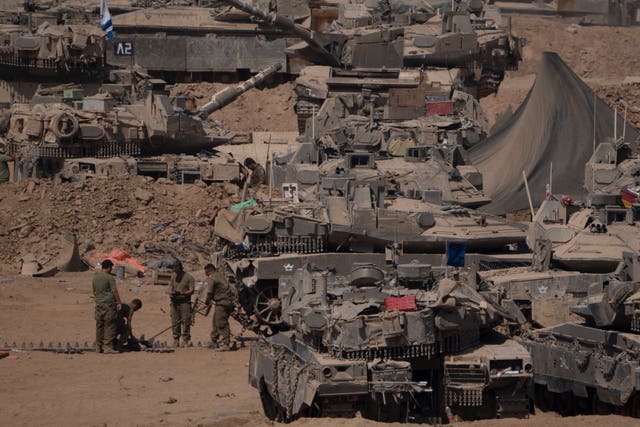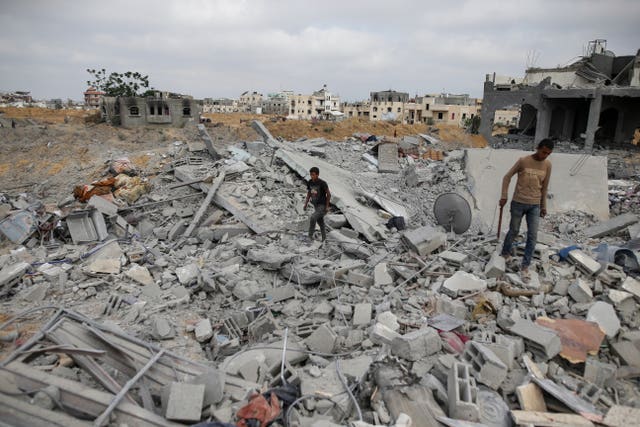Israeli troops launch attacks in central Gaza
The move possibly marks a widening of the Israeli ground offensive.

The Israeli military said it has started “operational activity” in two areas of central Gaza in a possible broadening of its ground offensive against Hamas.
The military said its forces are operating “both above and below ground” in eastern parts of Deir al-Balah and Bureij, a built-up Palestinian refugee camp dating back to the 1948 war surrounding Israel’s creation.
It said the operation began with air strikes on militant infrastructure, after which troops began a “targeted daylight operation” in both areas.

The eight-month offensive has largely cut off the flow of food, medicine and other supplies to Palestinians who are facing widespread hunger.
International mediators are waiting for Israel and Hamas to respond to a new ceasefire and hostage release proposal, according to Qatar, which has played a key role in negotiations alongside Egypt and the United States.
Announcing the proposal last week, US President Joe Biden said the three-phase plan was Israeli.
However, Israeli leaders have since appeared to distance themselves from the proposal and vowed to keep fighting Hamas until the group is destroyed.
Israel’s war against Hamas in Gaza has killed more than 36,000 Palestinians, according to the health ministry, which does not distinguish between combatants and civilians.
Israel launched the war in Gaza after Hamas’ October 7 attack, in which militants stormed into southern Israel, killed some 1,200 people – mostly civilians – and abducted about 250. Around 80 hostages captured on October 7 are believed to still be alive in Gaza, alongside the remains of 43 others.
Earlier, an independent group of experts warned famine is possibly under way in northern Gaza but that the war between Israel and Hamas and restrictions on humanitarian access have impeded the data collection to prove it.
The group known as the Famine Early Warning Systems Network (Fews Net) said famine in Gaza “is possible, if not likely”.
Concerns about deadly hunger have been high in recent months and spiked after the head of the World Food Programme last month said northern Gaza had entered “full-blown famine” after nearly seven months of war. Experts at the UN agency later said Cindy McCain was expressing a personal opinion.

An area is considered to be in famine when three things occur: 20% of households have an extreme lack of food, or are essentially starving; at least 30% of the children suffer from acute malnutrition or wasting, meaning they are too thin for their height; and two adults or four children per every 10,000 people are dying daily of hunger and its complications.
That is according to the Integrated Food Security Phase Classification, a collection of UN agencies, governments and other bodies that in March warned famine was imminent in northern Gaza.
Tuesday’s report by Fews Net is the first technical assessment by an international organisation saying that famine is possibly occurring in northern Gaza.
Funded by the United States Agency for International Development, Fews Net is an internationally recognised authority on famine that provides evidence-based and timely early warning information for food insecurity.

It also helps inform decisions on humanitarian responses in some of the world’s most food insecure countries.
But for a formal declaration of famine, the data must be there.
Such a declaration could be used as evidence at the International Criminal Court as well as at the International Court of Justice, where Israel faces allegations of genocide.
The report cautioned that data collection would likely be impeded as long as the war goes on. It said people – including children – are dying of hunger-related causes across the territory and that those conditions will likely persist until at least July, if there is no fundamental change in how food aid is distributed.
The report also cautioned that efforts to increase aid into Gaza are insufficient, and urged Israel’s government to act urgently.
The UN and international aid agencies for months have said not enough food or other humanitarian supplies are entering Gaza, and Israel faces mounting pressure from top ally the US and others to let in more aid.
Israel has repeatedly denied there is famine under way in Gaza and rejected allegations it has used hunger as a weapon in its war against the militant Hamas group. It has opened a number of new crossings into Gaza in recent months, saying they helped increase the flow of aid.
But Israel has also been expanding its offensive in Gaza’s southern city of Rafah, once the main hub of humanitarian aid operations. That invasion has largely cut off the flow of food, medicine and other supplies to Palestinians facing hunger.
The Israeli military, which is responsible for the crossings into Gaza, did not immediately respond to a request for comment on the Fews Net report.





